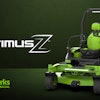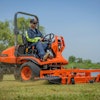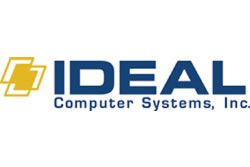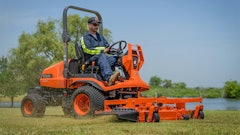A dealer's communication with distributors and manufacturers is a hugely significant part of their daily operations. Options for modes of contact between parties vary with each OEM, resulting in the dealer's need to learn numerous systems. In an effort to simplify these interactions, several software companies who design dealer management systems have chosen to support a standard for communication called the Partners Standard Protocol (PSP).
"The PSP is a multi-industry effort to take the many business-to-business interfaces, such as purchase orders, and agree to the format in which that interface shares information from the dealer to the OEM, distributor or supplier and back," says David Johnson of ADP Lightspeed, a member of the PSP.
A DIVINE DESIGN
The PSP was developed by the Motorcycle Industry Council (MIC). It began within the powersports industry, but has transformed into a standard for various additional industries. With the PSP, communications are streamlined and two-way.
"The PSP is a modern, thorough interface," says Dennis Haefner of Ideal Computer Systems. "It allows two-way communication when most of what we've done over the years has only been one-way." With the PSP, dealers will no longer send a purchase order and follow it up with a phone call. Thanks to the PSP, they will receive an electronic response within the system, almost immediately confirming the order.
An additional convenience aside from the two-way communication is that all communication is done within the dealer's business management system rather than on manufacturer or distributor websites, which are often more complicated than a PSP-compliant business management system. By integrating the PSP into the dealer business management system, it is remarkably accessible for all employees within the dealership. The system itself is also very intuitive.
"With the PSP, everything is done inside the business system," explains Steve Stinson of c-Systems Software. "If you are looking for a replacement part within the system and find you do not have it, it automatically sends a message to the manufacturer and then back to you, notifying if and when they can have it in stock." The ease of operation within the business system as well as the ability for immediate response from distributors or manufacturers saves dealers time and money, aiding in the ultimate success of their business.
PROACTIVE PARTNERS
The success of the PSP relies not only on the MIC, but also the active participation of the industry's software companies as well as engine and equipment manufacturers. Currently, the software companies supporting the PSP include: ADP Lightspeed, c-Systems Software, Ideal Computer Systems, MIC Systems & Software and Softpower Business Solutions.
These software companies have jointly adapted their business management systems to comply with the PSP standard for communication between dealers and manufacturers. Their goal in supporting the PSP is to enhance the convenience and abilities of their communication systems.
The PSP is also seeing support from several equipment manufactures, but few from within the outdoor power equipment industry. Kawasaki and Honda are both currently backing the PSP. The lack of OEM support is a result of manufacturer reluctance to change their own individual operating systems. "Most of it relates to dealer adoption, time, and of course, cost," explains Johnson. "Making changes to internal systems is a very involved process for a large corporation."
Regardless of whether or not the manufacturers adopt the PSP system, they can still continue to do business with their dealers. As they continue to receive purchase orders through their own systems, they question why they would need to join the PSP movement, not realizing the convenience it would afford their dealers.
"Many OEMs are already receiving a large percentage of their documents electronically via websites, making it difficult to justify the expense," says Bob Senger of Softpower. "The problem is they have forced dealers to hand-enter data that is automated in their business systems."
Typically, dealers work within their business systems and are required to save a file or purchase order to their PC before accessing the Internet and uploading their file to the manufacturer website. The process is both time consuming and strenuous, but the manufacturer's workload is not impacted by the extensive process.
As manufacturers, the high cost of implementing the system does not seem justified due to the fact that it does not directly improve their processes. "Many OEMs are looking at it from a cost/return point of view," explains Senger. "It is difficult to quantify the concept of improving your customers to improve your business." One onboard OEM, Kawasaki, has said they view the importance of being PSP-compliant not as an increase in revenue, but an increase in customer satisfaction.
THE FUTURE OF PSP
Something that may attract OEMs to the PSP is the promise of additional features. The current system solely offers communication abilities between dealers, distributors and manufacturers regarding purchase orders. Many other aspects will be added to the standard in the future.
"The real value of any standard only grows through the adoption and continuing development of it," says Pat Sweeney, vice president of business development at the MIC. "Currently, product registration and warranty claims are being developed and scheduled to be published in 2008. Ongoing development will focus on high-value transactions in the areas of sales, finance and service."
Product and warranty registrations are being considered as ideal add-ons to the PSP-compliant business management systems, adding a convenience that will satisfy both parties. "We've just begun working on product registrations as well as warranties," says Stinson, who also serves on the business advisory council at MIC. "Product registrations and warranties are two things that not only do what the dealer wants, but also what the manufacturer is not currently getting, especially not electronically." Ideally, the system will evolve to the extent where a customer's purchase of a product automatically registers it through the system.
The additional features are not the only way to convince manufacturers of the benefits of being committed to the PSP. Dealers as stakeholders in the manufacturers' success should voice their desires to work together using a PSP-compliant system.
"Dealers need to be clear with their OEM partners on what they want to help improve their efficiency," urges Johnson. "In this day and age, a dealer who has to hand-key purchase orders or warranty claims is wasting valuable time."
When the dealer is relieved of these unnecessary and time-consuming duties, they will have more time to cater to the needs of their customers. Having the time to spend with customers and the ability to request their equipment or replacement parts in a timely manner will improve the dealership's chances at success with each satisfied customer. The success of the dealer translates to success for the equipment manufacturer.



















